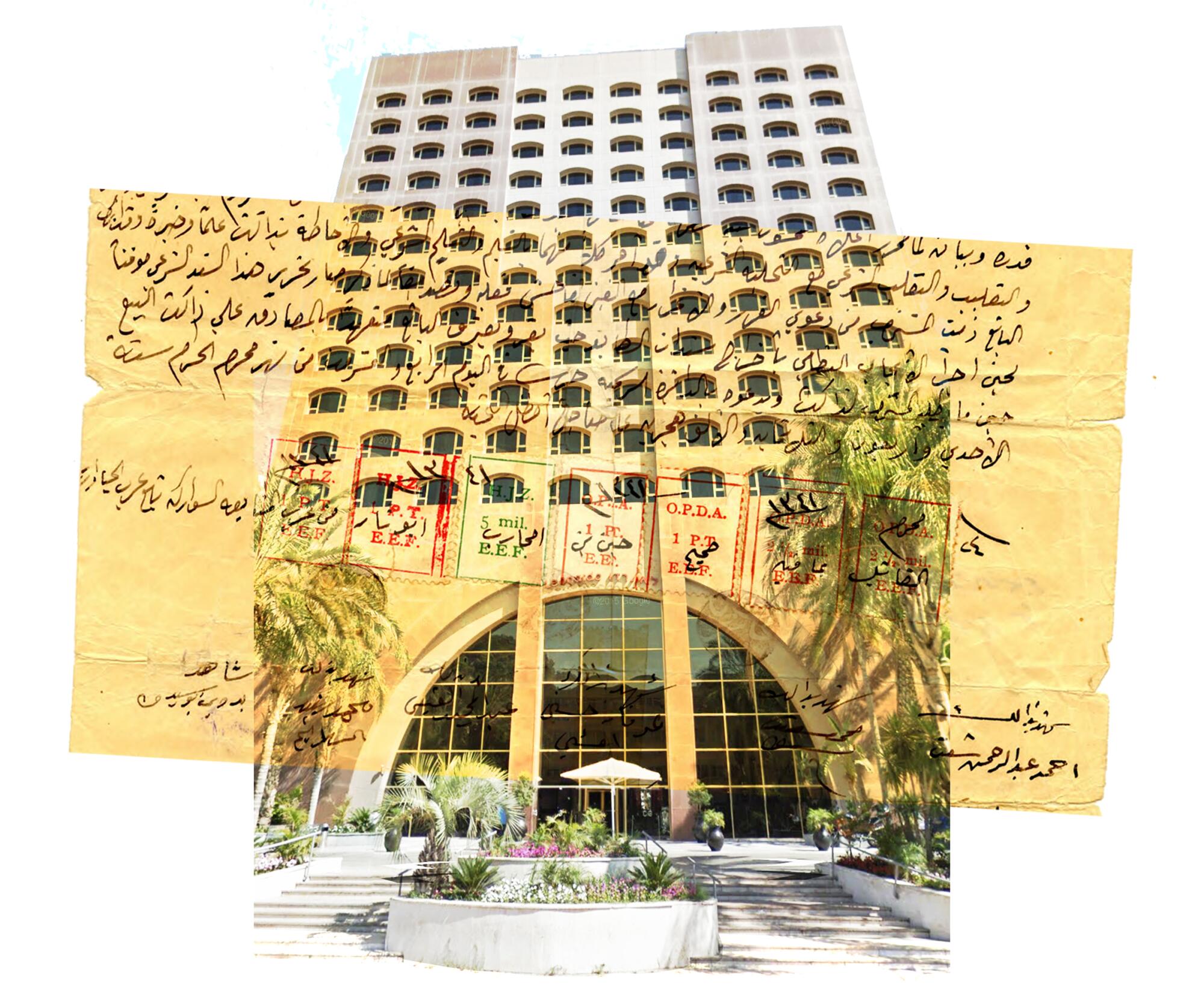A deed to land that was owned by the writer’s grandfather, superimposed over a picture of the high-rise constructing on that web site in Beersheba at this time.
(Los Angeles Instances photograph illustration; Adel Bseiso photographs)
My father, Jawdat Bseiso, was 23 when all the pieces modified.
As the favourite son of Mahrous Mustafa Bseiso — one of many largest landowners in southern Palestine — he was being groomed to inherit our household’s legacy. My grandfather was a distinguished businessman in Beersheba, a thriving Palestinian metropolis the place Muslims, Christians and Jews as soon as lived collectively in peace.
Then got here Could 15, 1948. Palestinians realize it because the Nakba — the Disaster. That day, tons of of hundreds of Palestinians, together with my total household, had been forcibly displaced in the course of the founding of the state of Israel. Our lands, houses and companies had been seized, and we had been labeled “absentees” despite the fact that we had been violently expelled and our properties expropriated.
In a single day, my household grew to become refugees. Our house, together with tons of of hundreds of acres of our land in Beersheba and elsewhere, was taken and handed over to the Israeli state. The property was listed below that authorities’s Custodian of Absentee Property, however we had been by no means absentee: We had been pushed out and never allowed to return and regain our household properties.
I used to be born in 1962 in Al Bireh, close to Ramallah within the West Financial institution. My household finally immigrated to america and have become residents. Like many different refugees, my mother and father shielded us from the previous. My father hardly ever spoke of what had occurred. He carried the ache silently, his eyes at all times seemingly mounted elsewhere, trapped between reminiscence and loss.
In America, I confronted the standard immigrant struggles: racism, bullying and the stress to assimilate. To guard myself, I turned to wrestling and martial arts. As an grownup I finally made a profession within the music trade, however even then I felt I needed to disguise. As a substitute of working below my given identify, Adel, I glided by Eddie, then Edvardo, and eventually Vardo Bissiccio, leaving my Arabic identify out of my profession. Success got here, however the starvation for reality remained.
I spent years trying to find solutions: what we had misplaced, who we actually had been and what had been stolen from us. Lengthy after my grandfather and father handed away, I saved looking, and I discovered solutions — a trove of proof corresponding to land deeds, tax information, gross sales contracts and letters of correspondence, painstakingly gathered and verified. They inform a narrative of prosperity earlier than displacement, and of authorized rights denied. In addition they protect the legacy of my grandfather, a person who turned the desert into gardens, farms and trade round Beersheba within the early twentieth century.
Though this search started from a private craving, I spotted the ensuing assortment could possibly be worthwhile to many others. Certainly, after I invited students to confirm and assess the recordsdata, we concluded that the Bseiso household archive is the biggest recognized assortment of authentic paperwork from a single Palestinian household, detailing authorized land possession earlier than the 1948 Nakba.
In 2019, I started digitizing the information, and Columbia College finally agreed to deal with the gathering inside its fashionable Arab research program. In 2025, we launched BFArchive.org, making Palestinian historical past extra accessible to students, journalists and the general public.
Could 15 marks the 77th anniversary of the Nakba. Our paperwork now function authorized and historic proof not solely of our personal story but additionally of a broader sample of dispossession.
None of that is meant to problem the existence of the state of Israel or to erase some other group’s historical past. Our objective is justice. We intention to set the report straight and pursue compensation for the billions of {dollars}’ value of property that was unlawfully taken from our household and from so many others.
The worldwide dialog is altering. Hundreds of thousands now march in help of Palestine. Nations world wide are recognizing Palestinian statehood and the suitable of return. What was as soon as hidden is being dropped at gentle. A “black swan” second — a tipping level for justice — is approaching.
The dimensions of what was taken from us is staggering: land, legacy, alternative. However behind these materials losses lies one thing deeper, a historical past, a rightful place within the narrative of the land we as soon as known as house.
For many years, I’ve preserved not simply paperwork however tales. Oral histories handed down from my grandfather, my father and our elders converse of a time earlier than the Nakba — of neighborhood, coexistence and peace. In addition they bear witness to what got here after: exile, erasure and ongoing injustice.
My household’s archive exists to protect these truths and to make them not possible to disregard.
Adel Bseiso, an American Palestinian music producer, lives in Los Angeles.


